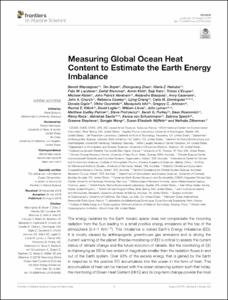| dc.contributor.author | Meyssignac, Benoit | |
| dc.contributor.author | Boyer, Tim | |
| dc.contributor.author | Zhao, Zhongxiang | |
| dc.contributor.author | Hakuba, Maria Z. | |
| dc.contributor.author | Landerer, Felix W. | |
| dc.contributor.author | Stammer, Detlef | |
| dc.contributor.author | Köhl, Armin | |
| dc.contributor.author | Kato, Seiji | |
| dc.contributor.author | L’Ecuyer, Tristan | |
| dc.contributor.author | Ablain, Michael | |
| dc.contributor.author | Abraham, John Patrick | |
| dc.contributor.author | Blazquez, Alejandro | |
| dc.contributor.author | Cazenave, Anny | |
| dc.contributor.author | Church, John A. | |
| dc.contributor.author | Cowley, Rebecca | |
| dc.contributor.author | Cheng, Lijing | |
| dc.contributor.author | Domingues, Catia M. | |
| dc.contributor.author | Giglio, Donata | |
| dc.contributor.author | Gouretski, Viktor | |
| dc.contributor.author | Ishii, Masayoshi | |
| dc.contributor.author | Johnson, Gregory C. | |
| dc.contributor.author | Killick, Rachel E. | |
| dc.contributor.author | Legler, David | |
| dc.contributor.author | Llovel, William | |
| dc.contributor.author | Lyman, John | |
| dc.contributor.author | Palmer, Matthew Dudley | |
| dc.contributor.author | Piotrowicz, Steve | |
| dc.contributor.author | Purkey, Sarah G. | |
| dc.contributor.author | Roemmich, Dean | |
| dc.contributor.author | Roca, Rémy | |
| dc.contributor.author | Savita, Abhishek | |
| dc.contributor.author | Schuckmann, Karina Von | |
| dc.contributor.author | Speich, Sabrina | |
| dc.contributor.author | Stephens, Graeme | |
| dc.contributor.author | Wang, Gongjie | |
| dc.contributor.author | Wijffels, Susan Elisabeth | |
| dc.contributor.author | Zilberman, Nathalie | |
| dc.date.accessioned | 2023-06-06T17:57:08Z | |
| dc.date.available | 2023-06-06T17:57:08Z | |
| dc.date.issued | 2019 | |
| dc.identifier.citation | Meyssignac, B., Boyer, T., Zhao, Z., Hakuba, M. Z., Landerer, F. W., et al. (2019) Measuring Global Ocean Heat Content to Estimate the Earth Energy Imbalance. Frontiers in Marine Science, 6: 432, 31pp. DOI: https://doi.org/10.3389/fmars.2019.00432 | en_US |
| dc.identifier.uri | https://repository.oceanbestpractices.org/handle/11329/2252 | |
| dc.description.abstract | The energy radiated by the Earth toward space does not compensate the incoming radiation from the Sun leading to a small positive energy imbalance at the top of the atmosphere (0.4–1 Wm–2). This imbalance is coined Earth’s Energy Imbalance (EEI). It is mostly caused by anthropogenic greenhouse gas emissions and is driving the current warming of the planet. Precise monitoring of EEI is critical to assess the current status of climate change and the future evolution of climate. But the monitoring of EEI is challenging as EEI is two orders of magnitude smaller than the radiation fluxes in and out of the Earth system. Over 93% of the excess energy that is gained by the Earth in response to the positive EEI accumulates into the ocean in the form of heat. This accumulation of heat can be tracked with the ocean observing system such that today, the monitoring of Ocean Heat Content (OHC) and its long-term change provide the most efficient approach to estimate EEI. In this community paper we review the current four state-of-the-art methods to estimate global OHC changes and evaluate their relevance to derive EEI estimates on different time scales. These four methods make use of: (1) direct observations of in situ temperature; (2) satellite-based measurements of the ocean surface net heat fluxes; (3) satellite-based estimates of the thermal expansion of the ocean and (4) ocean reanalyses that assimilate observations from both satellite and in situ instruments. For each method we review the potential and the uncertainty of the method to estimate global OHC changes. We also analyze gaps in the current capability of each method and identify ways of progress for the future to fulfill the requirements of EEI monitoring. Achieving the observation of EEI with sufficient accuracy will depend on merging the remote sensing techniques with in situ measurements of key variables as an integral part of the Ocean Observing System. | en_US |
| dc.language.iso | en | en_US |
| dc.rights | Attribution 4.0 International | * |
| dc.rights.uri | http://creativecommons.org/licenses/by/4.0/ | * |
| dc.subject.other | Earth’s Energy Imbalance (EEI) | en_US |
| dc.subject.other | Global Ocean Heat Content (OCH) | en_US |
| dc.title | Measuring Global Ocean Heat Content to Estimate the Earth Energy Imbalance. | en_US |
| dc.type | Journal Contribution | en_US |
| dc.description.notes | ocean heat content, sea level, ocean mass, ocean surface fluxes, ARGO, altimetry, GRACE, Earth
Energy Imbalance | en_US |
| dc.description.refereed | Refereed | en_US |
| dc.format.pagerange | 31pp. | en_US |
| dc.identifier.doi | https://doi.org/10.3389/fmars.2019.00432 | |
| dc.subject.parameterDiscipline | Human activity | en_US |
| dc.bibliographicCitation.title | Frontiers in Marine Science | en_US |
| dc.bibliographicCitation.volume | 6 | en_US |
| dc.bibliographicCitation.issue | Article 00432 | en_US |
| dc.description.sdg | 14.a | en_US |
| dc.description.methodologyType | Reports with methodological relevance | en_US |
| obps.contact.contactname | Benoit Meyssignac | |
| obps.contact.contactemail | benoit.meyssignac@legos.obs-mip.fr | |
| obps.resourceurl.publisher | https://www.frontiersin.org/articles/10.3389/fmars.2019.00432/full | |
 Repository of community practices in Ocean Research, Applications and Data/Information Management
Repository of community practices in Ocean Research, Applications and Data/Information Management

